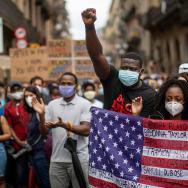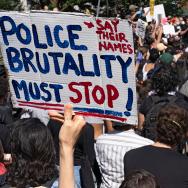Nearly a year after the death of George Floyd at the hands of a white police officer, Americans remain more likely than they were before his death to say that police violence is a serious problem—but relatively few say attention in the past year to the issue has led to positive change, according to a survey from the AP-NORC Center for Public Affairs Research at the University of Chicago.
The survey, which was completed after the conviction of former Minneapolis police officer Derek Chauvin for murdering Floyd, also shows about half of Americans still think police who cause harm on the job are treated too leniently by the justice system. Similarly, most people say the guilty verdict in the Chauvin trial has not improved their view of the criminal justice system.
Large majorities of the public continue to support the implementation of many policies aimed at reducing police violence, and most Americans say the country’s criminal justice is in need of serious transformation.
While most Americans say that racism remains a problem in this country, there are large gaps in how Black and white Americans view both racism and police violence. Although 60% of Black Americans view racism as an “extremely” serious problem, less than a quarter of white Americans agree. Most white Americans, however, do describe racism as a “very” or “moderately” serious problem.

Forty-five percent of the public, including 36% of white and 77% of Black Americans say police violence against civilians is very or extremely serious. Nearly the same proportion of the country (42%) consider violence against police to be extremely or very serious.
Protests against police violence and racism have been held across the country since the murder of Floyd on May 25, 2020. But less than a quarter of Americans think that additional attention on police violence is yielding positive change, with 54% of Black Americans expecting not much difference.
Indeed, 43% of all Americans and 68% of Black Americans think discrimination against Black people has increased over the past year. Sixty percent of the public say Black Americans face a lot of discrimination in the United States these days. An overwhelming majority of Black adults agree (84%), and most report frequent discrimination when dealing with police, while shopping, looking for a job, or applying for housing or a loan. Very few white Americans report the same experiences.
Although the number of Americans who say police are more likely to use deadly force against Black people than white people is down from the results found in an AP-NORC survey conducted soon after George Floyd’s death, a majority—including nearly all Black Americans—still think the police are more likely to use lethal force against Black people than white people.
About half of the public—including 45% of white and 72% of Black adults—think police officers who cause injury or death in the course of their job are not treated strictly enough by the justice system. This is higher compared with 2015, but down from June 2020, when nearly two-thirds of all Americans said police officers are treated too leniently.
At least 70% of Americans, regardless of race, support policies including body camera requirements; holding police accountable for excessive force, racially biased policing; and misconduct by their peers; requiring racial bias training; and establishing civilian review boards. Only 21% support the reduction of funding for law enforcement.

A majority of Americans—including 61% of Black Americans—reported that Chauvin’s April 21 conviction of murder and manslaughter had no impact on their confidence in the criminal justice system.
The nationwide poll was conducted April 20-May 3, 2021 using the AmeriSpeak® Panel, the probability-based panel of NORC at the University of Chicago. Online and telephone interviews using landlines and cell phones were conducted with 1,842 adults. The margin of sampling error is +/- 3.2 percentage points.
In addition, Black adults were sampled at a higher rate than their proportion of the population for reasons of analysis.
—A version of this release was first published by AP-NORC.









